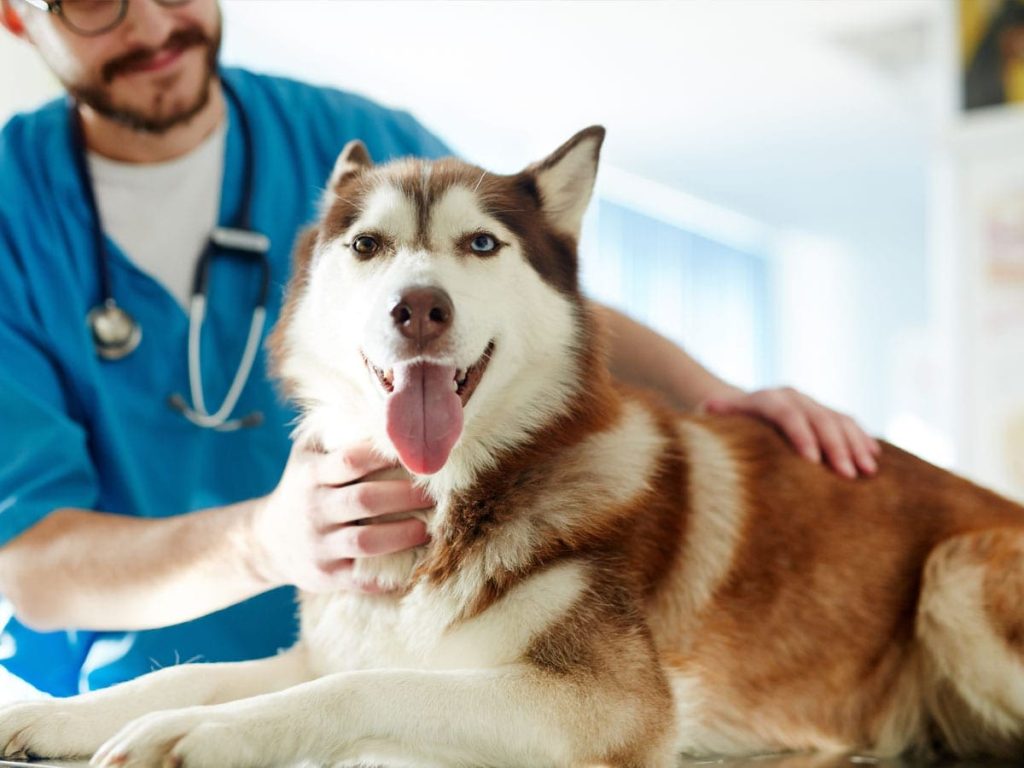
Veterinarians are healthcare providers who care for and protect animals. If you love animals and think the medical field is interesting, you may be thinking about becoming a veterinarian. Read on to learn all about what veterinarians do, how to start down the veterinarian career path, and why people become vets.

A veterinarian is a medical professional who focuses on the health and welfare of animals. Veterinarians diagnose and treat animal diseases and injuries. Additionally, veterinarians do research to improve animal welfare and treatment. Veterinary patients can include pets, livestock, exotic animals, and animals going through rehabilitation.
|
Career Path Overview for Veterinarian |
|
|
Education Requirements |
Doctoral or Professional Postgraduate Degree |
|
Recommended Degree Programs |
BS in Companion Animal Science, Master’s in Animal Science and Behavior |
|
Average Salary (2020) |
$99,250 |
|
Workers Employed in U.S. (2020) |
86,800 |
|
Projected Job Openings by 2030 |
101,300 |
|
Projected Growth Rate |
17% |
|
Other Job Titles |
Animal Behaviorists, Animal Nutritionists, Veterinary Scientists |
| Related Careers | |
Source: U.S. Bureau of Labor Statistics, Occupational Outlook Handbook for Veterinarians
What Does a Veterinarian Do?
A veterinarian goes through schooling to learn about animal science and behaviors. But why do people become veterinarians? Reasons to become a vet include an interest in medicine and a love of animals. Veterinarians are similar to human medical doctors, but they work on animals instead of people.
Veterinarians can work with many different species. Those with specialized training can treat exotic animals like reptiles, big cats, and more. No matter what specialty a veterinarian practices, they need a wide range of knowledge and a lot of compassion for animals. A few examples of veterinary specialties include:
- Clinical Veterinary Pharmacology: These vets are highly educated in the drugs and prescriptions animals take.
- Internal Veterinary Medicine: These vets are specialists who focus on treating complex, complicated, and rare animal diseases.
- Veterinary Nutrition: These vets are highly knowledgeable in animal diets and can develop specific diet plans for their animal patients.
- Veterinary Sports Medicine: These vets work with athletic animals like racehorses and dogs to keep them in tip-top shape.
- Specialized Veterinarians: These vets specialize in developing in-depth knowledge related to specific animals or groups of animals like birds, livestock, horses, exotic mammals, reptiles, and more.
Veterinary Technician Job Description
A veterinary technician assists the veterinarian and provides support in the same way a nurse helps a doctor. If you’ve thought to yourself, “I want to be a veterinarian,” but you don’t want to go through vet school, you can consider becoming a vet tech.
Vet techs frequently interact with animals and perform important tasks under the supervision of a vet. Vet tech job duties include:
- Performing lab operations
- Animal handling
- Administering treatments
- Dispensing medications
- Updating medical records
Advanced Veterinarian Job Description
Veterinarians use their expertise to diagnose illnesses and treat injuries. In addition to supervising vet techs, vets also have hands-on responsibilities. These include physical animal examinations, dental checkups and procedures, performing surgeries, and, sometimes, performing necessary euthanizations.
Vets make judgment calls based on their knowledge of animal science and medicine. Additionally, vets prescribe medications to treat different animal illnesses. They work with pet owners to create wellness plans, diets, and more.
- Providing medical advice and diagnoses
- Performing dental and medical checkups
- Prescribing medications
- Performing surgeries
- Administering annual vaccinations
Where Do Veterinarians Work?
Veterinarians primarily work in animal hospitals and private veterinary clinics. Veterinarians can also be mobile to treat animals on-site when necessary. They may travel to different places like farms, racetracks, zoos, and animal sanctuaries.
Some vets work in the food safety and inspection industry. They travel to places where animals are kept to ensure the animals are healthy and living in safe conditions.
- Veterinary Services: 80%
- Self-Employed: 11%
- Government: 3%
- Advocacy Organizations and Education: 2%
Source: Bureau of Labor Statistics Veterinary Work Environment
In the Office
Veterinarians spend the majority of their time in the office, whether it be in a vet clinic or an animal hospital. These clinics usually have set business hours each week. However, most vets work beyond the office’s business hours due to difficult cases and emergency calls.
Veterinarians spend most hours on their feet walking between examination rooms. They also use office equipment like exam tables, specialty lighting, stethoscopes, IV pumps, sterilizers, imaging machines, surgical equipment, and laboratory equipment.
In the Field
Although vets usually spend most of their working hours in the office, they can also make house calls. These often take them to farms, ranches, racetracks, rehabilitation centers, and even slaughterhouses. This kind of veterinary work can be physically demanding and require lots of strenuous activity.
Vets in the field must be careful when treating animals that are large or fearful. Scared animals can often lash out and injure themselves or the vet. Also, emergency services performed in the field are more difficult due to the non-sterile conditions.
Average Salary of a Veterinarian
The median salary for a veterinarian is $99,250 according to the Bureau of Labor Statistics May 2020 data. The highest-earning ten percent of veterinarians earned over $164,490. The lowest-earning ten percent of veterinarians earned under $60,690.
Considering that the median salary for all healthcare occupations in the US in May 2020 was $84,430, veterinarians typically earn quite a bit more. Veterinarians in Texas have the highest average salary at $122,530. New York is a close second with $120,840 and California follows with $116,220.
- Average Salary for Veterinary Technicians: $36,000
- Average Salary for Junior Veterinarians: $75,000
- Average Salary for Senior Veterinarians: $125,000
Top five states with the highest employment rates for Veterinarians (2020):
|
State |
Employment |
Hourly Average wage |
Annual Average Salary |
|
1,300 |
$ 61.75 |
$ 128,430 |
|
|
1,450 |
$ 61.60 |
$ 128,120 |
|
|
140 |
$ 61.21 |
$ 127,310 |
|
|
260 |
$ 60.88 |
$ 126,630 |
|
|
1,560 |
$ 59.06 |
$ 122,840 |
What Is the Job Outlook for Veterinarians?
The job outlook for veterinarians is extremely positive. The Bureau of Labor Statistics projects veterinary jobs will grow by 17 percent over the next ten years. That is about twice the average projected growth rate for all jobs. This is partially due to the high number of veterinarians that will retire over the next ten years.
Veterinary medicine is advancing quickly. People are spending more money on their pets, which is the driving force of veterinary employment. This boost in the industry, paired with the growing number of complicated veterinary procedures being invented, creates a healthy job outlook.
- Estimate of jobs available: 86,800
- Rate of projected job growth: 17%
- New jobs to be added in the next ten years: 14,500
- Fastest growing states for jobs: California, Texas, Florida
What Degree do you Need to Be a Veterinarian?
How do you become a veterinarian and what do you have to know to be a vet? To become a veterinarian, you will need to complete the necessary undergraduate prerequisite courses for your veterinary degree program. Although you don’t need a Bachelor of Science degree before applying to vet school, it is highly recommended since most schools prefer applicants with a bachelor’s degree. Then, you should attend veterinary school. There, you will get an advanced four-year degree called a DVM (Doctor of Veterinary Medicine) degree. After earning all the degrees and participating in the necessary veterinary training, you need to become licensed to practice veterinary medicine.
So, how long is vet school and how long does it take to be a veterinarian? It usually takes eight total years of schooling to become a vet. However, that includes a four-year Bachelor’s degree. But how long is veterinary school itself? Usually, it takes another four years.
You may ask, “Is vet school worth it?” and “Is becoming a vet worth it?” These are legitimate questions since that many years of schooling will require a lot of student loans and may result in large sums of student loan debt. The length of schooling is no different than the path to becoming a doctor for humans. If you want to become an animal doctor, it is definitely worth it.
Veterinarian High School Recommendations
High school students may be wondering what to do in high school to become a vet. There are a few things you can do to get a head start. Some high school classes to take to become a vet include science courses, advanced mathematics classes, and general studies. Additionally, a student should keep a high GPA to ensure their future acceptance to veterinary school.
Other high school classes to become a veterinarian include biology, chemistry, and life sciences like zoology. High-level college math courses like algebra, trigonometry, and calculus will also show up later, so it’s best to prepare early. Finally, proper communication is always important. So, general studies like English and communication are helpful in the field as well.
- Gain volunteer experience at a veterinary clinic, zoo, or animal shelter.
- Join animal advocacy and animal welfare clubs in high school.
- Take part in animal care and agricultural organizations like 4-H.
Veterinarian College Education Recommendations
Veterinarians receive a lot of education. When looking at how long vets go to school, the number of years can vary. While most American veterinary medical colleges do not require a bachelor’s degree to apply, some international veterinary schools do. Most applicants to vet schools have completed a bachelor’s degree with the necessary prerequisite courses. The career ladder for veterinarians requires a lot of schooling and training.
Those wondering how to get veterinary experience should know the fastest way to become a veterinarian is to first attend college for a four-year degree. Then, apply to veterinary medical school to gain specialized education and relevant experience in the field. You can also look into residency programs for pre-vet training.
Undergraduate
Future veterinarians should first get a Bachelor’s of Science degree in a field related to veterinary science. Relevant degrees include Biology, Chemistry, Zoology, Animal Science, and Animal Health and Behavior. Most importantly, when working toward your degree be sure to complete the required courses for your prospective veterinary medical school. Most schools have similar requirements for admission but make sure to check out the requirements for any school you plan on apply to. Relevant undergraduate courses include microbiology, animal nutrition, and anatomy and physiology.
Postgraduate
After receiving an undergraduate degree, you can choose to continue your education with a Master’s in Animal Science and Behavior. This professional postgraduate degree will solidify your path to veterinary school. Then, you will need to apply to veterinary school to receive your doctorate in veterinary medicine.
Licenses
Once a person has received their DVM, they must become officially licensed to practice veterinary medicine in their state. All states require potential vets to pass the North American Veterinary Licensing Exam (NAVLE). Some states have additional licensing requirements.
Recommended Unity Degrees and Courses
B.S. in Companion Animal Science
Graduates of Unity Environmental University’s Companion Animal Science program learn the scientific principles behind the care and well-being of animals living closely with people. This program applies principles of animal biology, chemistry, nutrition, and physiology specifically to companion animals and pets.
B.S. in Animal Health and Behavior
Graduates of Unity Environmental University’s Animal Health and Behavior program learn how animals think and why they do what they do. Graduates learn how to properly care for animals and advocate for their welfare. Students who receive this degree often work with captive animals of all different species. They may work in zoos, aquariums, wildlife preserves, rehabilitation centers, and more.
Explore More Career Paths Related to Veterinarians
Zoologist
Zoologists study animal species in their native habitats and in captivity. Zoologists can travel all over the world to learn more about animals and how they live. They research how different environmental factors, like climate change, affect animals. Similar to veterinarians, zoologists are dedicated animal lovers.
Wildlife Rehabilitator
Like veterinarians, wildlife rehabilitators use their knowledge of animal biology to treat injured and sick animals. However, the eventual goal is to release the animals back into the wild once they are cured. Wildlife rehabilitators can encounter all kinds of wild animals during their time on the job.
Marine Biologist
Marine biologists can specialize in several different interests and disciplines. In general, marine biologists research marine organisms and their habitats. Marine biologists may work in fisheries to boost fish populations. Or, they can research how certain marine species interact. The job description of a marine biologist is broad, but it shares some key similarities with that of a veterinarian.



